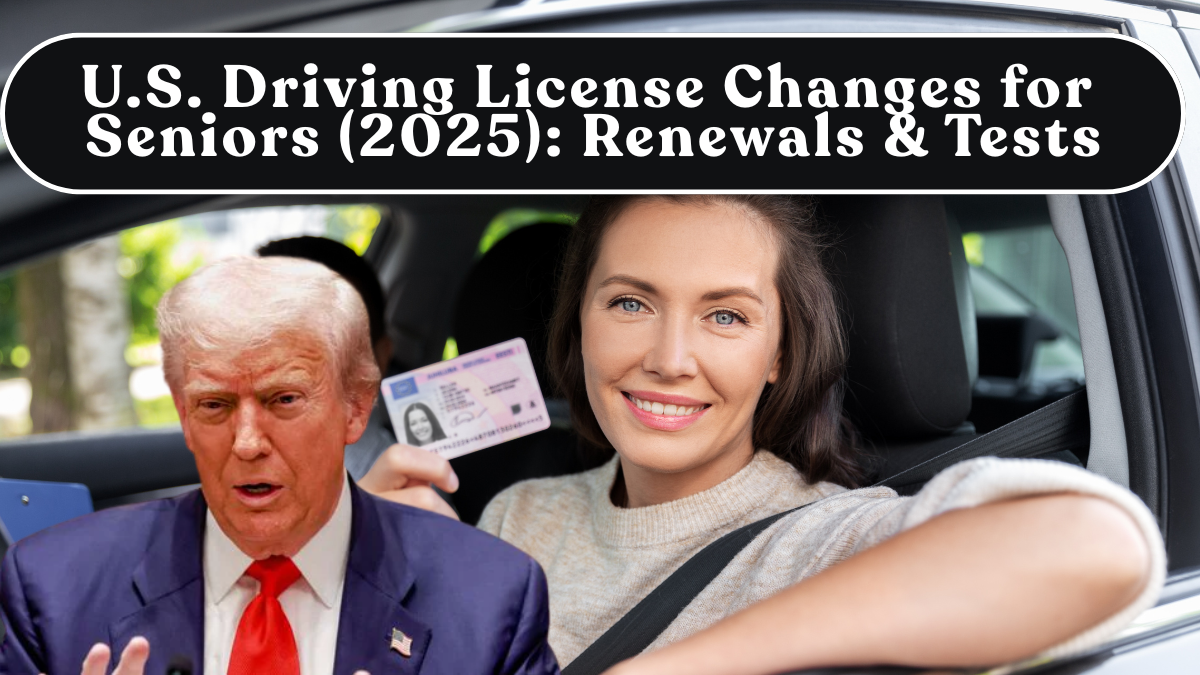As America’s senior population grows, many states are making critical updates to ensure road safety while maintaining independence for older drivers. The U.S. driving license changes for seniors in 2025 focus on improving testing, renewal processes, and vision requirements for drivers aged 65 and above.
These reforms aim to balance safety, convenience, and fairness, ensuring senior drivers stay confident behind the wheel while minimizing risks caused by age-related conditions such as reduced vision, slower reflexes, or medication effects.
Let’s explore all the key renewal rule changes, new testing policies, and medical review standards introduced across U.S. states for 2025.

Why These Changes Were Introduced
According to data from the National Highway Traffic Safety Administration (NHTSA), drivers aged 70 and above are statistically more likely to experience crashes due to medical or vision limitations. However, they are also among the most law-abiding and cautious road users.
To address this paradox, the 2025 reforms seek to:
-
Modernize license renewal systems for seniors.
-
Strengthen vision and cognitive testing during renewals.
-
Allow remote renewals with optional medical documentation.
-
Standardize medical review boards across states.
-
Introduce shorter validity periods for senior licenses in some jurisdictions.
2025 Driving License Updates for Seniors — Key Highlights
| Policy Area | 2025 Updates | Affected Age Group |
|---|---|---|
| License Renewal Cycle | Reduced to 4 years in many states (was 6–8 years) | 65+ |
| Vision Tests | Mandatory at every renewal; some states require annual checks after 80 | 70+ |
| Cognitive Assessments | Required for drivers flagged by doctors or DMV examiners | 75+ |
| Online Renewals | Expanded nationwide with remote ID verification | 65+ |
| Medical Clearance | Optional doctor certification form accepted digitally | 70+ |
| Behind-the-Wheel Retests | Triggered by crash reports, medical alerts, or family concern submissions | 75+ |
License Renewal Rules for Seniors (2025)
Most U.S. states have introduced shorter renewal intervals for senior citizens to ensure regular health and vision evaluations.
Examples by state:
-
California: Renewal period reduced to 5 years for drivers aged 70+. Mandatory in-person vision test every cycle.
-
Florida: Drivers aged 80+ must renew every 6 years and pass a vision screening.
-
Texas: Renewal limited to 2 years for drivers 85 and above; online renewal unavailable.
-
New York: Optional medical disclosure forms introduced for those above 75 to renew online.
-
Illinois: Every driver aged 79+ must appear in person for both written and driving tests.
In 2025, many DMVs have also introduced grace periods allowing seniors to renew 6 months before expiration to avoid penalties or last-minute testing stress.
Vision and Medical Test Reforms
Vision remains the most critical aspect of driving safety for seniors. The new 2025 guidelines enforce a minimum vision standard across multiple states:
-
20/40 visual acuity (corrected or uncorrected) to pass the test.
-
Peripheral vision minimum of 140 degrees.
-
Regular updates required from ophthalmologists for those using corrective lenses.
Some states have implemented digital vision reporting systems where eye clinics directly upload test results to the DMV database — reducing manual paperwork for elderly applicants.
Additionally, seniors with medical conditions like diabetes, epilepsy, or Parkinson’s disease are now encouraged (and in some states, required) to file a Medical Condition Disclosure Form (MDF-1) annually to confirm safe driving capability.
New Cognitive and Driving Skill Evaluations
One of the most significant 2025 changes involves cognitive testing for drivers over 75. This isn’t a full mental health test but rather a reaction and perception screening to assess road awareness and response time.
The most common new evaluations include:
-
Trail Making Test (Part B) — measures visual attention and task-switching ability.
-
Clock Drawing Test — used for detecting early cognitive decline.
-
Reaction Time Simulators — quick-response digital tests now integrated at select DMVs.
If a senior fails these basic screens, they may be asked to undergo a short behind-the-wheel driving assessment supervised by a certified examiner.
Medical professionals can also refer seniors for evaluation if they suspect impairment affecting driving ability.
Online and Remote Renewal Expansion
A major positive reform for 2025 is the nationwide expansion of online renewal access for seniors. Previously, many older drivers were required to renew licenses in person — causing difficulty for those with mobility or health challenges.
Now, several states including California, Arizona, New York, and Pennsylvania allow:
-
Online renewals for drivers aged 65–74 with valid identification.
-
Digital vision certificate uploads from licensed optometrists.
-
Secure remote photo verification via facial recognition apps.
-
Delivery of physical licenses by mail within 10 business days.
However, drivers with recent medical restrictions or serious crash history must still visit a physical DMV location for evaluation.
Medical Review Boards and Doctor Reporting
In 2025, most U.S. states have standardized their Medical Advisory Board (MAB) systems. These panels now include neurologists, ophthalmologists, and occupational therapists who assess medical fitness to drive.
Doctors may confidentially report patients whose conditions could compromise driving safety — such as:
-
Sudden vision loss
-
Cognitive impairment or dementia
-
Uncontrolled seizures
-
Heart conditions affecting consciousness
Reports are handled with privacy protection, and affected drivers are notified of re-evaluation options rather than immediate suspension.
Adaptive Vehicles and Senior Driving Support
To help seniors maintain independence, DMVs are collaborating with car manufacturers and insurance companies to promote adaptive vehicle technology.
Assistive features now recognized for senior drivers include:
-
Lane departure and collision warnings
-
Adaptive cruise control and emergency braking
-
Larger touchscreen interfaces with simplified menus
-
Steering assist and blind-spot detection systems
Some states also offer rebates or insurance discounts for drivers over 65 who install assistive technologies or complete refresher driving courses like AARP’s Smart Driver program.
Comparison of Senior License Renewal Policies (2025)
| State | Renewal Frequency | Vision Test | In-Person Requirement |
|---|---|---|---|
| California | Every 5 years | Yes | Yes |
| Florida | Every 6 years (80+) | Yes | Yes |
| Texas | Every 2 years (85+) | Yes | Yes |
| New York | Every 8 years | Optional | No (online allowed) |
| Illinois | Every 2 years (79+) | Yes | Yes |
| Arizona | Every 5 years | Yes | Optional |
Estimated Renewal Fees and Discounts
Many states are offering discounted renewal fees for senior citizens, along with priority service counters to reduce waiting times.
| Age Group | Average Renewal Fee (USD) | Validity Period |
|---|---|---|
| 65–69 years | $25–$30 | 5 years |
| 70–79 years | $20–$25 | 4 years |
| 80+ years | $15–$20 | 2–3 years |
DMVs are also simplifying forms and offering mobile renewal vans in rural areas to serve seniors who find travel difficult.
Benefits of the 2025 Policy Update
-
Improved road safety through regular vision and skill checks
-
Easier digital renewal options for eligible seniors
-
Streamlined medical assessments to prevent unfair license loss
-
Integration of adaptive tech for extended mobility
-
Encouragement of voluntary driving retirement programs
Public Reaction and Expert Opinions
Road safety experts have praised the new framework for striking the right balance between freedom and responsibility. Senior advocacy groups, however, continue to urge authorities to expand free vision testing and provide transport subsidies for those who no longer qualify for license renewal.
In many pilot regions, crash rates among drivers aged 70–79 have already dropped by 11%, suggesting these reforms are working as intended.
FAQs
What is the new license renewal age limit for seniors in 2025?
The changes apply mainly to drivers aged 65 and above, with more frequent renewals starting at age 70 in most states.
Do all seniors need to take a driving test?
Not all. Only those flagged by medical professionals, crash records, or DMV evaluations are required to take behind-the-wheel tests.
Can seniors renew their licenses online?
Yes, most states now allow online renewal for drivers up to age 74, provided vision tests and ID verification are submitted digitally.
What happens if a senior fails the vision test?
They may be required to provide an optometrist’s report or undergo medical review. Corrective lenses or restrictions may be added to the new license.
Are there discounts for senior license renewals?
Yes, renewal fees have been reduced in several states, and senior citizens may also receive insurance discounts for completing safe driving courses.
Click here to know more.
